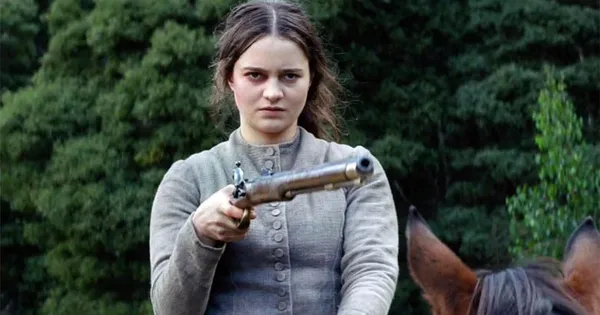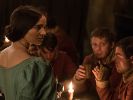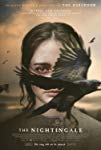Eye For Film >> Movies >> The Nightingale (2018) Film Review
The Nightingale
Reviewed by: Jennie Kermode

Few début features have ever made an impact on the scale of The Babadook, so when it emerged that Jennifer Kent was working on her second feature, expectations were high. What nobody expected was that it would be so different. Set almost two centuries early and shaped throughout by forces infinitely more ancient, it uses a square aspect ratio like Andrea Arnold's Wuthering Heights to immediately remove viewers from the familiar spaces of cinema and force them into close contact with the characters. With numerous close-up shots of it's heroine's face, it's a film that looks back, that gazes also into you.
Clare (Aisling Franciosi) is the nightingale of the title, or so she's told when she's dressed up and made to sing for the English soldiers. Indigenous Tasmanian Billy (Baykali Ganambarr), when the difference becomes clear to him, calls her Ireland, and there is a metaphorical aspect to her story that echoes throughout. A former convict, she is at the mercy of the sadistic Lieutenant Hawkins (Sam Claflin), who is perpetually on edge and looking to shore up his fragile ego be exercising power over others. The film opens with a rape that yields nothing to the familiar language of cinema - barely sexual at all in the way that it's shot, it is simply a display of brutality, with viewers pending most of it looking directly into Clare's eyes. You may find this hard to stomach. If so, you're as well to give up, because you won't make it through what follows.

The horror packed into the first 20 minutes of this film makes The Babadook seem, well, like a children's story. It's nothing that we haven't see in cinema before but its power stems from the way it's presented. There is no titillation. There are no mercifully distracting stylistic flourishes. There's no romanticisation of events, no pretence of empowerment. Clare's world, her very being, is systematically destroyed. What emerges is somebody quite different.
This, then, is a film about seeking revenge, but it's also a film about the connection between two island nations at opposite ends of the Earth, both the subject of English conquest and attempts at genocide, both seeking to hold onto their culture and identity through the speaking of outlawed languages, the practice of ritual and the singing of songs. Clare needs a guide to go after her quarry. She's reluctant to travel with Billy because of the stories she's been told about black men, but she has little choice. For his part, he has no time for white people, but over time he comes to see the similarities between them. Approached in a different way, this might almost have been a buddy movie. There are moments of humour between the two as their relationship begins to thaw. Though it's Clare we're initially following, Billy has a full, complex story of his own and is far more than a sidekick there to help her understand herself. Though she initially mocks his ritual activities, treating them as ludicrous, Kent never frames them as such and over time they gain a weight of meaning even for those encountering them for the first time.
Many cultures have responded to colonialism by seeking refuge in the deep forest and here a journey through thick bush takes on mythic aspects, especially in scenes when Clare is alone with her dreams and flashbacks, a shortage of food - to which she has given no priority - weakening her to the point where she sometimes seems to lose touch with reality. She's ready to respond to her losses with an extreme violence which many survivors of trauma at the hands of others will relate to. Meanwhile, we see Hawkins and his travelling companions engage in further misogynistic violence, emphasising the ubiquity of such behaviour in social environments of this sort. Hated for her Irishness, and without papers, Clare has no safe place of refuge, whilst Billy is at constant risk because of his ethnicity. A further rape scene emphasises the relationship between misogyny and racism, but it's how people - and peoples - survive such omnipresent terror that is Kent's real focus.
The centring of Clare's obsession in a narrative that might as easily give way to despair lends itself well to the film's mythic tone. She - and Billy too, in time - are rebels whose cause has already been lost, but the act of rebellion becomes important in itself. With masculine entitlement and aggression as the enemy, the film also has a universal relevance, and Kent is not afraid to have her characters talk openly about solutions that are still politely left off the agenda elsewhere.
Fully committed right from its opening scenes, this is a film that never flinches. The central performances are superb and Kent handles the complicated pacing with real assurance. Though it has only a handful of characters and rarely allows us to see more than a few feet beyond them, there is an epic quality about The Nightingale which people used to think female directors couldn't deliver. Kent has marked herself out as one of the most powerful filmmakers of her generation; there's no doubt that she's here to stay.
Reviewed on: 31 Oct 2019

















